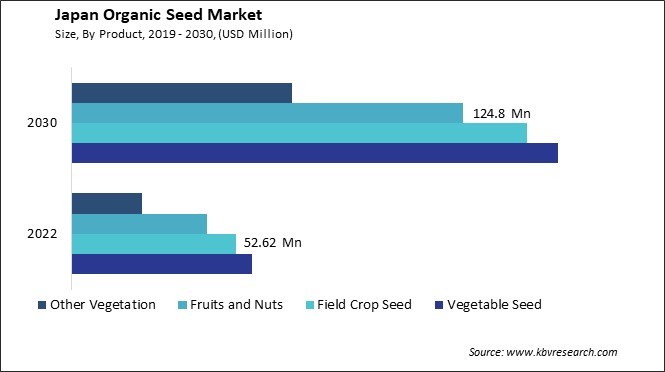The Japan Organic Seed Market size is expected to reach $495.52 million by 2030, rising at a market growth of 13.9% CAGR during the forecast period. In the year 2022, the market attained a volume of 28.50 Million units, experiencing a growth of 14.1% (2019-2022).
The organic acids market in Japan has witnessed significant growth in recent years, driven by increasing consumer awareness about health and wellness, rising demand for natural and organic products, and a growing emphasis on sustainable and eco-friendly alternatives. With consumers in Japan increasingly opting for healthier and cleaner-label products, the demand for organic acids in the food industry has seen a notable uptick.

One of the key drivers of the organic acids market in Japan is the rising consumer preference for healthier and natural alternatives in food and beverages. Japanese consumers are becoming more health-conscious and are actively seeking products that are perceived as clean-label and free from synthetic additives. Organic acids, being naturally occurring compounds, fit well into this trend, as they offer a way to extend the shelf life of products without resorting to chemical preservatives.
The organic acids market in Japan is also influenced by the country's stringent regulations on food safety and quality. As consumers demand products with fewer synthetic additives, manufacturers are turning to natural preservatives like organic acids to meet regulatory requirements while maintaining the desired product attributes. This shift is particularly evident in the development of organic acid-based preservatives for meat and seafood products, where maintaining freshness is crucial. In the pharmaceutical industry, organic acids also find applications in drug formulation and as excipients in various medications. This diversification of applications further bolsters the organic acids market in Japan, creating opportunities for innovation and product development.
In recent years, Japan has witnessed a notable expansion in the cosmetics and personal care sector, with a key driver being the growing utilization of organic acids in various beauty and skincare products. Organic acids, derived from natural sources, have gained prominence for their beneficial properties, aligning with the Japanese consumers' increasing preference for organic and sustainable options.
The Japanese cosmetics industry has seen a paradigm shift towards formulations emphasizing skin health and well-being. Citric acid, for instance, is renowned for its exfoliating and brightening capabilities, contributing to the formulation of facial cleansers and exfoliating masks that cater to Japanese consumers' desire for radiant and flawless skin.
In addition to skincare, organic acids play a pivotal role in hair care products, where citric acid is often used to balance pH levels and enhance the shine and manageability of hair. This aligns with the Japanese cultural emphasis on healthy and well-groomed hair. The Japanese cosmetic industry's expansion into organic acids also reflects a broader trend of innovation and adaptability. As consumers become more educated about the benefits of natural ingredients, cosmetic companies in Japan are actively incorporating organic acids into their product lines to stay competitive in the dynamic beauty industry.
According to the International Trade Administration, in 2019, Japan's cosmetics and personal care products industry reached a substantial industry size of approximately USD 35 billion. Notably, skincare products held a significant share, comprising 53% of the overall Japanese cosmetics industry. The surge in demand for eye zone care products gained prominence, attributed to the global COVID-19 pandemic and the widespread use of face masks. This trend has especially impacted the organic acid market within Japan's cosmetics and personal care sector, indicating a potential expansion and increased focus on products incorporating organic acids. Thus, Japan's organic acids market's growth within the cosmetics and personal care sector is driven by the increasing demand for natural, sustainable, and effective beauty solutions.
The organic acids market in Japan is experiencing a notable shift towards sustainable agriculture, reflecting the country's growing commitment to environmental stewardship and responsible farming practices. This transformation is driven by an increasing awareness of the ecological impact of conventional agricultural methods and a recognition of the need to address environmental challenges.
Japanese farmers and agricultural stakeholders are placing a heightened emphasis on sustainable practices within the organic acids market, signaling a departure from traditional chemical-intensive approaches. This shift is motivated by a desire to reduce the ecological footprint of agriculture, minimize soil degradation, and promote long-term environmental health. In response to consumer demand for eco-friendly products, Japanese farmers are adopting organic acids as a key component in sustainable agricultural strategies.
Organic acids, such as citric acid and acetic acid, are gaining popularity as alternatives to synthetic chemicals in fertilizers and pesticides. These acids offer effective solutions for pest control and soil enrichment while aligning with the principles of organic farming. The Japanese government has also played a pivotal role in promoting sustainable agriculture, offering incentives and support programs to encourage the adoption of organic acid-based solutions.
Japan's organic acids market has witnessed significant growth in recent years, driven by increasing consumer awareness of sustainable and eco-friendly products, rising demand for organic acids in various industries, and a growing emphasis on environmental conservation. One prominent player in the Japanese organic acids market is Mitsubishi Chemical Corporation. With a strong focus on innovation and sustainability, Mitsubishi Chemical has been at the forefront of developing organic acid applications in various industries. The company's commitment to environmental responsibility aligns with the global shift towards greener alternatives, and it has made substantial investments in research and development to enhance the efficiency and sustainability of organic acids production processes.
Another key player is Nippon Shokubai Co., Ltd., a chemical company with a significant presence in the organic acids market. Nippon Shokubai has been actively producing acrylic acid and its derivatives, which have applications in adhesives, superabsorbent polymers, and coatings. The company's dedication to quality and technological advancements has positioned it as a leading contributor to the organic acids industry in Japan.
Additionally, Kao Corporation, a well-known multinational chemical and cosmetic company headquartered in Tokyo, has been actively exploring the potential of organic acids in its product portfolio. Kao Corporation focuses on developing biodegradable and sustainable solutions, and organic acids are crucial in this strategy. The company's commitment to eco-friendly alternatives has driven its engagement in research and partnerships to advance organic acid applications.
Ajinomoto Co., Inc., a global food and chemical company headquartered in Tokyo, has also ventured into the organic acids market. The company’s interest in organic acids extends beyond traditional chemical applications as the company explores their potential in the food and beverage industry. This diversification showcases the versatility and applicability of organic acids in different sectors.
Furthermore, Sumitomo Chemical Co., Ltd. is actively contributing to the growth of the organic acid market in Japan. The company produces various organic acids, such as acetic and propionic acids. Sumitomo Chemical strongly emphasizes sustainability and has implemented measures to enhance the eco-friendliness of its manufacturing processes. As the demand for environmentally friendly solutions continues to rise, these companies are well-positioned to play a pivotal role in shaping the future of the organic acids market in Japan.
USA Organic Seed Market, by Product
Our team of dedicated experts can provide you with attractive expansion opportunities for your business.

